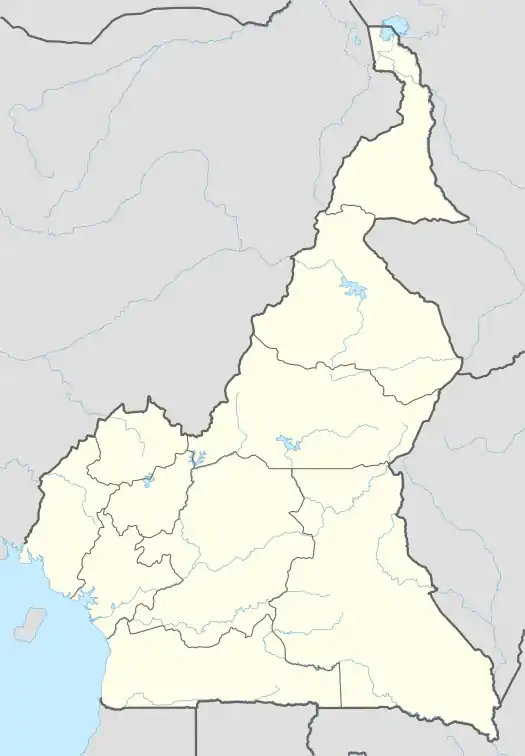Bamali
Bamali village is one of the four villages that make up Ndop Central sub division and one of the thirteen villages of Ngoketunjia division of the North West region of Cameroon. Bamali village is located partly along the ring road from Bamenda some 40 km away from Bamenda town on the Bamenda-Nkambe stretch of the ring road just before reaching Bamunka (Ndop town).
Bamali | |
|---|---|
 Bamali Map of Cameroon showing the location of Bamali | |
| Coordinates: 5°57′9″N 10°26′15″E | |
| Country | Cameroon |
| Region | Northwest |
| Department | Ngo-Ketunjia |
| Elevation | 1,138 m (3,734 ft) |
| Population (2005)[1] | |
| • Total | 7,690 |
| (Census) | |
| Time zone | UTC+1 (WAT) |
Since 2009, the village of Bamali have had chieftain problems following the dethronement of the then Fon, Idriss Nopu Ndouafoua II. The decision to dethrone him was taken by the Ngumba secret society and a new Fon presented to the public. Some of the reasons for Fon Ndouafoua's dethronement, as cited by the Ngumba member, include violation of Bamali tradition and culture, seizure and sale of land, grabbing of people's wives and his unilateral dismissal of village notables.[2]
Administrative authorities have however since refused to recognize the newly enthroned Fon thereby leaving Bamali Village without a Fon or in other words with two Fons, one who lives in the Palace with the population in the village and another who was dethroned, and lives out of the village but is recognized by the administration.[3]
History
Mangeh villages believe that Mangeh had five children, two sons (Tuningmungwa and Chengfong) and three daughters (Byiae, Vhenji and Mekheng). The eldest Tunigmungwa succeeded their father and formed Bambalang while his brother Chengfong established the Bamunka village whereas Byiae formed Bamali, Vhenji formed Bafanji and Mekheng the Bamunkumbit village. Bambalang and Bamunka were descendants of the males (sons of Mangeh) while Bafanji, Bamunkumbit and Bamali are the descendants of the daughters. These five villages have formed the Mangeh Family Association to maintain peace and unity amongst themselves to ensure progress of all. These villages have no defined boundary between them because they know that they are one. Mangeh branches are found all over the country and abroad.[4] supporting a population of 20.863 people.
Education
There are several educational institutions including government owned, privately owned and denominational ranging from nursery, primary through secondary and high schools.
Politics

In 2007 Bamali village saw themselves going away with the juiciest political positions in Ngoketunajia North Constituency thanks to the enigmatic Njingum Musa Mbotuh(computer engineer) who braved all odds and won the lone parliamentary seat for the constituency. The protagonist of the ruling party (CPDM) held then, that Ngoketunjia North Constituency was lagging behind in development because they made wrong political choices in the past. He championed the campaign of the CPDM during the parliamentary/municipal elections in 2007 and it dawned that he was going to be the new parliamentarian for Ngoketunjia North Constituency. Since then, he has made strides and gained more popularity with his work. He has labelled himself the "Mosses" of Ndop central and Babessi Sub Divisions that make up the Ngoketunjia North constituency. Back in his constituency, he is regarded as a father to all and referred to as Daddy while his works were in 2012 rewarded with a second mandate to represent the people of Ngoketunjia North constituency. His ingenuity in politics has earned him several awards from several media organs notably, The Watchdog Tribune, World Echoes, The Guardian Post, Life Time and most recently The Eye Newspaper where he was voted as Best Politician of The Year 2015. His savoir-faire was also rewarded in the national assembly when he was elected to be one of four Questors in the national assembly of Cameroon and he was recently elected to chair the Monetary and Financial Affairs committee of the legislative arm of the African union, the PAN African parliament. Hon. Njingum Musa was born on 1 January 1960 in Bamali village, Ndop central sub division, Ngoketunjia Division of North-West Region.[5] [6] [7] [8] [9]
References
- "3rd RGPH 2005" (PDF). Archived from the original (PDF) on 2017-12-16. Retrieved 2016-11-16.
- "Bamali Fon deposed". cameroon postline. The Post. Retrieved 16 November 2016.
- "Bamali Chieftaincy crisis". The Eye. Fai Cassian. Retrieved 16 November 2016.
- Ghogomu, Ezekiel Nkonki (2009). Outline history of Mbaw-Yakum.
- "Bamali Chieftaincy crisis". The Eye. Fai Cassian. Retrieved 16 November 2016.
- "session program" (PDF). European Parliament. Retrieved 16 November 2016.
- "About Committees". PAN African Parliament. Pan African Parliament. Archived from the original on 17 November 2016. Retrieved 16 November 2016.
- Njoya, Mbah Isofa. "Ngoketunjia politics, a Njingum Musa Affair. Others waiting for elections time". Ngoketunjia Online. Retrieved 16 November 2016.
- "bureau questors". Retrieved 16 November 2016.
Further reading
- Jean-Pierre Warnier. Cameroon Grassfields Civilization. African Books Collective, 2012 - 164 p.